#saint walpurga
Explore tagged Tumblr posts
Text


Listen she's kinda gross clearly fucked up.
but I like her
24 notes
·
View notes
Text





On May 13, 1717, at around seven-thirty in the morning at the Hofburg in Vienna, a daughter was born to Emperor Charles VI and his wife Elisabeth Christine. On the evening of the same day, the infant was baptized by the name of Maria Theresa Walburga Amalia Christine....
...
Maria was a Christian name given to all Habsburg daughters. Maria was the patron of the dynasty and its lands, magna mater Austriae, the head of the hierarchy of saints and most powerful of all heavenly intercessors. Theresa referred to one of the central figures in the post-Tridentine communion of saints, the Spanish mystic Teresa of Ávila; canonized in 1622, patron of the Spanish monarchy, and founder of the order of Barefoot Carmelites. Walburga was an eighth-century saint, the object of great popular devotion in Austria and the patron of childbirth. The baby was named Amalia after one of her two godmothers, Amalia Wilhelmina, widow to Joseph I. Lastly, the name Christine was taken from her mother, Elisabeth Christine of Brunswick-Wolfenbüttel.
Maria Theresa: The Habsburg Empress in Her Time - Barbara Stollberg-Rilinger
#maria theresa#charles vi#elisabeth christine of brunswick-wolfenbüttel#house of habsburg#habsburg#habsburg dynasty#austria#long live the queue#Teresa of Ávila#Wilhelmina Amalia of Brunswick#saint walpurga
6 notes
·
View notes
Text
Mischief Night
Tonight is Mischief Night in the United States, Canada, and the U.K. keep the pranks harmless, kids.
Tonight is Mischief Night, an informal holiday celebrated by children and teenagers in the United States, Canada, and the U.K. It’s celebrated on the night before Halloween (usually October 30). On this night, people are supposed to play harmless pranks on their neighbors or family members. I am not a fan of pranks, but the common pranks include egging houses or toilet-papering trees. A…

View On WordPress
1 note
·
View note
Text
Of Walpurgisnacht and Witches!
Gut Walpurgisnacht! I was shocked — shocked! — to discover that I have never even mentioned this holiday on this blog, despite having gotten AWFULLY close, by writing about May Day, which it anticipates, and many European Pagan/Christian hybrid holidays. If you believe you’ve never heard of it before, I hope you have at least a vague sense that you’ve come across the word? It features…

View On WordPress
18 notes
·
View notes
Text
thinking about how Faust is so aloof and distant with everyone, and wields a big fuck-off zweihander, but nearly all of her IDs and EGOs are supportive in nature (with the notable exception of L corp remnant), providing debuffs or sanity healing as opposed to direct damage. is it a facade and she actually cares? or are the supportive abilities more like a representation of her strategic genius? (the latter feels much more applicable to Grip faust than the former) i don’t know, but i find it interesting nonetheless
#limbus company#project moon#lcb faust#it sucks that faust's chapter is likely the last one#we're gonna be waiting a while#back to the first point i am reminded that in the city a zweihander is a symbol of stability and defense due to the Zwei Association#which makes faust's choice of weapon even more interesting#speaking of Walpurgisnacht is the name of a german holiday#specifically the night before a feast held in honor of Saint Walpurga#who was famous for fighting both disease and witchcraft#interesting name for the sword of a genius scientist#i wonder if this will gain more relevance later
31 notes
·
View notes
Text

Sketch zur Walpurgis-Nacht!
#Witch#sketchbook#dark art#Walpurgis Night#Day of St. Walpurga#Saint Walpurga's Eve#Beltane#Brocken#witchcraft
2 notes
·
View notes
Note
Okay so based on the comments, who explained that Hexennacht is actually Walpurgis Night, I went to look this up, and from the start something just didn't click here, because I've heard of Walpurga before, but not in this context.
Looking up 'hexenacht' brought me to a wikipedia article explaining that Walpurga is a christian saint figure, who fought against the plague and withcraft. I was immediately feeling very 'boo' about it, down with fake christian holidays. But, according to everything else I know, Walpurga could not have been a christian saint, they must have faked the lore to make her into this, I think she must have been a witch.
I know Walpurga's name from two pieces of media; one is Harry Potter, where she was Siruis' mother, one of the most vicious witches presented to us from the wizarding past. The other one is Madoka, where Walpurga was the most deadly, dangerous witch in the human history, who was about to erase the human world. Both pieces of media show her as a witch, and a very dangerous one at that.
Confused to how she could in reality be a christian saint, I read her wikipedia page in detail, and now I'm ever more confused. It says she was born in England, acted as a christian missionary (ew). It was said she repelled the effects of withcraft. and her tomb apparently produces oil that is said to heal sickness; christians are selling this oil.
She was recognized as a saint after her death,on May 1st, thus the holiday of the Feast of Walpurga, and Walpurga night.
The holiday preceding the Walpurga Night was May day, and people were lighting bonfires, and celebrating sabbath. It's very normal for christians to overwrite existing cool holidays with their christian nonsense and make it about themselves, so this checks out, but nothing else does.
She repelled witchcraft? A woman? People, no, christians, believed that a woman repelled witchcraft? If she was a saint, why is her holiday Walpurgis night? When was any saint associated with the night? Night belonged to ungodly creatures. And feast? They threw a holiday, featuring a feast, for a female saint? They made it a crime when a woman ate a piece of fruit.
She had to be a witch. Walpurga had to be a witch, and they appropriated her, erased the reality of what she did, and made up this fake shit to overwrite the original sabbath, which was witch's night. They likely realized that bringing a male saint to the story wouldn't work on witches, so they took a witch from us, and said she was actually the one fighting against witchcraft. I can't see it any other way. In media she is still featured as a witch! No other saint has that kind of feature, imagine Mary from the bible casually being featured as a witch in media, it doesn't happen.
Looking at Walpurga's biography, she became a nun, translated manuscripts, and made exceptional needlework from silver and golden threads. She did a lot of educating. But there's nothing else there that would justify her being declared a saint; when in the history was a woman declared a saint for being incredibly crafty, intelligent and resourceful? Those are witch's traits.
Sadly I also kept reading wikipedia until I got to the point where in Czech they still celebrate 'burning of the witches', they light bonfires and add a puppet witch to the fire, which enrages me. I am declaring war on this, how fucking dare you. Killing women is not a cause for celebration. This is disgusting.
If anyone can tell me the true lore of Walburga, or make sense of what I'm looking at, I would love to hear some alternative stories or explanations! I am convinced something is deeply off and being hidden in this story. I don't believe what is being said.
"summerween" it's called hexenacht you historically illiterate dweebs
'historically illiterate dweebs' is too quality of an insult to not publish, also can you share more information on hexenacth? I can tell it's 'night of the witches' in german, but, where I live, halloween is called 'night of the witches' as well! Does germany have an extra summer halloween I didn't know about? Or is this still about gravity falls? Please share the historical lore.
44 notes
·
View notes
Text
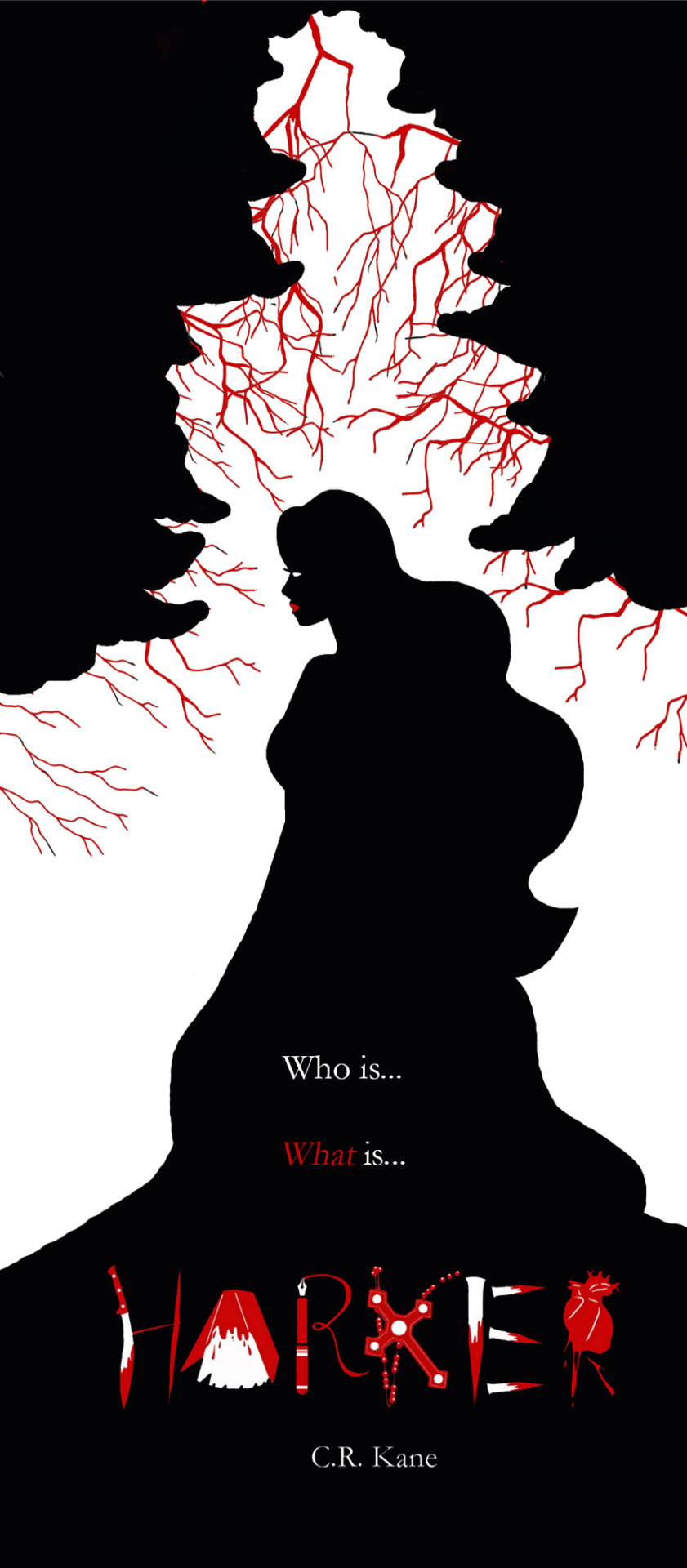
The trains go only so quick
The weather’s only so calm
For the people are all out
For celebration’s a balm
Our good friend sighs in shelter
Barred from revelry and fear
A storied local greets him
As a thunderhead draws near
Preface: For maximum effect, give, “Dracula’s Guest,” a read before proceeding.
The PDF version of the preview is here.
2
Walpurgisnacht
Munich held onto him longer than he would have liked. Had he been marooned in the place as a mere visitor he would never have opted to haunt the station rather than milling around through the celebrating streets. There was as much reveling as reverence at work due to the holiday. The far end of it, anyway. Jonathan had tucked a note on it in his schedule. Celebration meant delays even in the most sedate locales and there was every chance that this one’s might postpone his conveyance. He smiled tiredly at the shorthand, if only so he did not torture himself with looking at his watch for the third time in as many minutes.
‘Walpurgisnacht. Walpurgis Night. A holy day held in respect to Saint Walpurga, the 8th century abbess who warred with illness, pestilence, witchcraft and grim spirits. A time of grave superstition by dark and relieved gaiety by sunup with the witches and the dead all banished. The date has a predecessor in the form of the May Day festivals of old, making the time one of bonfires and fear, beauty and feasting.’ And apparently keeping the trains held up so that any wandering spirits cannot flee too far from the cemeteries.
Jonathan tucked the note away with the rest and battled with himself over whether he dared to stray from the platform or not. His train was meant to arrive at seven o’ clock, which meant that for safety’s sake he ought to be ready and waiting by six, even if the train was more likely to appear closer to eight. But the hour was now half-past five and he had taken his lunch early that day. He was down to rationing mints from their tin lest he give in to hunger and try to elbow his way through the crowded streets to find a restaurant. One that he would not even have time to truly enjoy, needing to eat speedily and flee back to the tracks. His stomach pinched him in protest. He held a fist against it to muffle a growl.
“You can wait.” He could. If there was no dining on the train, he would still make time for breakfast in Vienna. Or if not breakfast, lunch in Klausenburgh. Or… “Or I could just break and get a room for the night.” The words were a sigh. He had spied a hotel sitting in a picturesque spot near a spread of wild greenery that bled into woodlands. What was the name? “Quatre Saisons, I think,” he said under his breath. This, like the rest of his murmured commentary, was meant for no ears but his own. The festivities had left the station remarkably barren. Everyone who had traveled to or from the area wouldn’t be packing up until at least the next morning. So it came as a surprise when he heard a voice behind his head:
“You are an Englishman?”
Jonathan turned to see a man almost as young as himself peering down at him. A cluster of wild roses at his breast was the only flourish to his apparel. His expression was unreadable apart from an angle of suspicion to the brows.
“I am,” Jonathan allowed, grateful that he didn’t need to strain his tongue or the man’s ears with his fragmented German.
“You have come from the Quatre Saisons?” The suspecting angle deepened.
“No, but I was thinking I may have to book a room if the train comes too late.”
The man’s face softened at this, his posture relaxing an increment as he insisted, “The train will come late. Not too late, but still late. You must not bother with the Quatre Saisons either way.”
“Is it full?”
“Most rooms always fill in advance of these days. Inns and hotels shall all be swarmed from now until the seventh of May. But Herr Delbrück’s Quatre Saisons must not be tried. The place is not well this time of year.”
“I do not quite follow,” Jonathan said, his nose just catching the whiff of past toasts to the date on his companion’s breath. “How is it not well?”
“The land it sits with. It is bad to be near it, even after Walpurgisnacht has been and gone. There are…” the man seemed to catch himself on a word before pressing on, “…wild dogs that roam the forest and its valley. Strange souls who would take after the devils of last night, even as we light the fires against them. No, you must not stay there until at least the thick of summer. Better to try in the city’s heart if you must have a room.”
The rooms that were full of visitors already, according to the young man himself. Either way it still relied on Jonathan potentially spoiling the entirety of the client’s route as laid out and paid for from his own account. The idea of taking a room and gambling on a morning train was only a daydream. Jonathan almost said as much.
Instead, “I do not need a room, really. I can hardly risk missing the evening’s train by a minute. But I thank you for the advice, sir.” The young man frowned at Jonathan then, his eyes roaming the length of him in a searching way. “Are you waiting on the train as well?”
“I just purchased my ticket for the morning. It is better to travel by day. And to eat by it too.” He nodded at Jonathan. “You have not been in the city itself? You have partaken of nothing?”
“Sadly no. If I were here on my own account I should have liked to see more, but—,”
“The train will not come any earlier if you sit and starve.”
“Likely not. But I cannot risk wandering too far.” He regarded his luggage drearily. No, he dared not even risk a restaurant. Even the next stop would allow him only a glimpse of the city as he rushed from one point to the next. Perhaps he could find some time to wander when he reached the hotel, but not before. He clenched his belly against another snarl and popped another mint in his mouth. Only three left, but, “Would you care for one?”
The young man whispered something in his homeland’s tongue—it sounded to Jonathan like, “Better to have the leaves,”—but in English said, “I would. Thank you.” He laid it on his tongue as if it were a medicine pill. “But it is still not a supper. Take yourself away for a meal at least, Herr Englishman.”
So saying, the young man departed, perhaps for his own plate or hotel. Jonathan swallowed a sigh and put the tin away. Looking around he saw he really was the last one on the platform apart from one dozing woman playing chaperone to her family’s luggage. Her husband had taken the two sulking children back out into the streets to burn off some energy. With the surly toddlers and the brief conversationalist departed, the space felt oddly like an island. Even the clamor that leaked in from the mouth of the tracks was muted. Jonathan tried to bury himself in a book, but gave up as the text swam before his eyes.
What rest he had gotten was as thin as his last meal was distant. If he could only lay down and sleep through the hunger he might be satisfied, but that risked drowsing through the train whistle itself. He tucked the book away and took himself to the closest opening which showed the beginnings of twilight oozing over the tracks. His hand went again to the neglected journal at his heart and thought another apology at its pages. So far he’d only managed to jot his name within the cover.
“I am sorry,” he told the air. “My head is in no state for you yet.”
A sudden cold gust blew his words back. There was a rise of distraught voices from outside as the breeze whipped through. In the next moment there was a shift in the palette of the sky as a weighty cloud rolled over the last of the sun, plunging the outdoors into early dusk. After that came the pattering of hail. The last festive sounds turned to a disgruntled din before their noise was drowned entirely by the hammering on the station’s roof. Jonathan pulled his coat tight around him and wished luck out to the revelers.
Between one blink and the next, one of the latter manifested at the threshold below. She wore what would have been an immaculate costume of a bygone age if not for the burns that had assailed the fine old dress. Though perhaps that was merely a desired effect. She was likely going around as some witch or spirit who had escaped the bonfires’ efforts during the night. Between the platform’s glow and the outdoors’ new gloom she certainly possessed the half-lit look of a ghost.
The sort of ghost meant for a stage, he added to himself. She has an actress’ face.
Yes, an actress powdered and dressed to be a dead beauty. Her mouth was a full and somber curl of red against a carcass’ pallor. She carved it into a smile as she stared up at him, seemingly oblivious to the cold and hail at her back.
“Are you alright?” he asked in his stilted German. The woman only kept her faded eyes upon him. They had a pull to them that Jonathan couldn’t place. He found himself approaching the tracks’ edge before he realized his feet were moving. “Do you need help?” he added, wondering if the trouble was just a matter of shelter. The tracks were set deep and it would be a hassle to hoist oneself up to the platform’s edge.
“He tries again,” said the woman on the tracks. Possibly. Her German was almost as fractured as his own, albeit with a different inflection. “Another sent for. Another to travel with. Fast, fast, fast.” The sky growled at her words. A stage’s effects could do no better. With the thought in mind, he wondered:
Is this a performance?
Before he could ask, his stomach spoke for him. It was mortifyingly loud and the thunder’s next peal did not do enough to cover it. The woman’s expression cracked on a wider smile. She recited:
“Help, Heaven, help! who knows the Father
Knows surely that he loves his child:
The bread and wine from the hand divine
Shall make thy tempered grief less wild.”
Jonathan smiled back, glad to recall the verse. He and Mina had gone over it in the original text and the English for practice and preference’s sake. Lenore’s lines fell from him:
“Oh! mother dear mother! the wine and the bread
Will not soften the anguish that bows down my head;
For bread and for wine it will yet be as late
That his cold corpse creeps from the grim grave’s gate.”
The woman’s grin now bared teeth. They were brilliantly white against the crimson of her lips.
“Are you meant to be Lenore?” Jonathan asked.
“Lenore sought her lover. I sought only death.” Her hand rose toward him. “Will you help me find it?”
Thunder boomed as a new wind rolled through the station like a howl. The woman’s ruined dress and hanging hair danced wildly on her, though she seemed not to notice. Jonathan went toward her, deciding whatever act she adhered to would be better performed out of the elements’ reach. His hand reached down to hers. There was a moment when their fingers brushed and Jonathan felt sick at how frozen she felt even through his glove.
In the same instant he saw the dancing of lightning without. The bolts seemed almost like a great weaving animal, snapping in closer and closer bolts along the blackened sky. Intuition tightened in his chest. Suspicion leapt to certainty. There was no time to speak—
Get off get off the tracks it’s going to—
—only to grab for her hand.
But not fast enough. Another gale of wind rushed through, this time angled in such a way that it seized and flung him back against the floor. Lightning struck in the same instant. Noise blasted his ears. It was a nigh deafening din made from the crackle of electricity dancing on the tracks and the rattling roar of a thunderclap. Under it, he swore he heard the woman scream.
God oh God oh God hospital what is the word for hospital I need the dictionary I need—
He scrambled to his feet and back to the platform’s edge. His breath stayed trapped in his chest until he looked down.
And saw nothing.
There was no woman, alive or dead. He gawped for almost a minute at the bare tracks. The hail thinned away as he stared and the thunder softened to a grumble.
How..?
“You are hurt?”
Jonathan looked up and found the dozing mother had left her heap of baggage to check on him.
“No, no, not hurt. But there was someone…” He gestured at the tracks and limped through a few lines of German before she shooed his words away with her hand, switching briskly to English. He explained the scene in full and the mother nodded with something between grave intensity and a sprightly eagerness.
“Yes, there would still be some who wander late. Walpurgisnacht is night and day. Probably she is drifting back to her tomb, sulking that she did not get company for her bier. If you had your gloves off and showed your ring she may have not bothered. Lovers who die before the wedding day, they are the greediest souls on these nights.”
This she said with great authority and Jonathan had no desire to mention that he wore no ring as yet. No more than he had any urge to voice his suspicion that the woman had been very much alive and somehow made it away from the station’s threshold before the lightning could do any damage.
The other explanation is that the woman was, in fact, a roaming ghost come to collect a new member for the graveyard. It is the time of year for such things.
A call from the other end of the station turned the mother’s head. Father and children had come in from the storm, as had a smattering of other travelers. The train whistle bayed not long after. Jonathan looked to the tracks again as if the woman might suddenly rematerialize in the locomotive’s path. The only body that he could see was the outline of some animal at the edge of the platform’s glow. It looked like a large dog posed beside the tracks, tail still and eyes lambent. Jonathan held its stare for a moment. Then it was gone, loping off into the night.
This. This is worth writing about.
And it was. At least once his seat had him in it and a wonderfully dense meal sat in him. He brought out his stationery pages for the cause, jotting the entirety of his time in the station up to the arrival of the train. These loose sheets were reserved specifically for storytelling and recipe preservation, the better to possibly be scrapbooked away at home. The journal still drowsed in his pocket.
Hold out for the hotel room. Almost there.
Jonathan cupped a hand to his eyes to keep out the glare as he watched the world go by in the window. The storm was left behind now and the sky was all stars above rooftops and treetops alike. A brilliant wedge of a moon shined out at him. He was still admiring the view when the steward came along to tap his shoulder. There was a smile on his face but a glimmer of anxiety in his eye.
“Herr Harker, yes?”
“Yes,” Jonathan managed before the steward produced a telegram.
“For you. Will you have another drink?”
“No, thank you.” But the glass was already stolen away and refilled before he could finish the sentence. The steward vanished in nearly the same instant, looking as if he meant to finish the bottle himself. Jonathan puzzled over this a moment before turning his attention to the telegram.
BISTRITZ.
My friend, I send all apologies to you on account of the trains and the time. We arranged our meeting during the heart of much fervor, and such will always meddle with travel. I send this in anticipation of your own frustrations with the hindered hours and my gratitude for your steadfastness. I hope it shall please you to know that the Hotel Royale has its finest suite reserved and waiting for you, and so too for the Golden Krone of Bistritz after them. May their hospitality be a balm against the troubles of a passenger at the mercy of fickle clocks. —Dracula
Jonathan marveled at the message. It was a rarity in itself to have a client who made no fuss when it came to snags that the firm had no control over. To have one who foresaw said snags and went out of his way to apologize to the solicitor himself was unheard of. And from a noble?
He added the telegram to his memoranda with a smile.
#Dracula Daily has Jonathan fresh from exiting the first round of horrors#meanwhile in Harker...#(sorry buddy. doesn't get easier after this.)#jonathan harker#dracula#Harker#my writing#c.r. kane#dracula daily#re: dracula#dracula's guest#countess dolingen
163 notes
·
View notes
Text
The Ancient and Most Noble House of Black names explained:
I’ve gotten a few asks about my thoughts on the Black family and specifically their names and the middle names I’ve assigned them so I figured I’d make a post and explain them all, along with how I see the meanings of their names translating to their personalities! I was originally going to do the Black sisters and brothers in this one too but it just got too long so you guys are getting Riddle era Black family until I return with the second installment vjnbjgnbj
tw: brief mention of rape in Lucretia's section
Walburga Irma Black:
Unlike most of her family members, Walburga is not named after a star. Her first name is an alternative spelling of Walpurga which comes from Saint Walpurga, a nun born in 710. Saint Walpurga was also given an annual feast day called Saint Walpurgis Night or Saint Walpurgis Eve. Ironically one of the things she was hailed for was battling witchcraft. She was said to repel witches and was known as a healer of illnesses and one of her only talents not fully related to her religion is noted to be very detailed embroidery. I like to pull things from things like this, especially when it comes to characters we know very little about, so what this tells me about Walburga is that she likely did not have a lot of (female) friends which fits with the fact that I generally think the Black family kept to themselves. She was a skilled healer, which is very interesting considering how she’s usually portrayed as a woman who ruins so much. Is she aware of this aspect of her personality and that’s why she decided to learn so much about healing? And at last, she’s talented at embroidery. This yet again fits with another headcanon of mine that the finer families in pureblood society showed their status through things such as embroidery or homemade lace, to show that the women in the family were so well taken care of that they could focus on nothing but raising a family and making said family look good. I would imagine Walburga was taught by her mother.
Speaking of her mother, Walburga gets her middle name from her mother, Irma Black (born Crabbe) which means she is once again not given a name with a connection to the stars. Irma means complete; entire and is derived from the Old High German word ‘irmin’ meaning ‘world’. One could argue that while Walburga does not have a star specific name she is named in a way that could be interpreted as someone’s whole world.
Alphard Pollux Black:
Alphard is named after the star of the same name, the brightest star in the constellation Hydra. Alphard comes from the Arabic al-fard which, if Wikipedia is to trust lol, means “the individual”. The star is also known both as “the backbone of the Serpent” and “the heart of the Serpent”. From this I like to pull a bit of personality. Alphard has a clear connection to his family, one with a noticeable connection to serpent imagery through the Black family’s consistent history of being sorted into Slytherin. He’s an individual, he’s got the backbone to stand out yet still in a way more acceptable to the family and he’s got the heart to still show love and kindness towards Sirius. I think, and I don’t know if this is an unpopular opinion, that Alphard values his family a whole lot. Which is ironic, because in part that’s what gets him blasted off of the family tapestry. Another name for this star is Soheil Solitarius, which translates to the bright solitary one. I interpret this to think he’s got some sort of loneliness to him, even within a family with so many people. That is what being too much of an individual in the Black family gets you. You can only push it too much before you become an outsider and I think Alphard is living right on the cusp.
Just like Alphard, Pollux is yet another star that is the brightest in its constellation, this time it’s the Gemini constellation. Just like how Walburga got her middle name from her mother, Alphard got his from his father. The name Pollux, albeit also the name of a star comes from the twins Castor and Pollux in both Greek and Roman mythology.
As a fun little extra thing, I think Alphard’s fun older guy that he seduces whenever he feels like it (Arvid Thicket) calls him Hydrae and occasionally he calls him Hydra’s Heart because he’s a sap lol.
Cygnus Phineas Black:
Cygnus was the third Cygnus in the family, being named after his paternal grandfather. It's suspected that Cygnus I was likely Cygnus's great-great-grandfather which would be the father of the second man he's named after, former Hogwarts headmaster Phineas Nigellus Black. Cygnus, the constellation derives its name from the Greek word for swan. Looking at the most common symbolism associated with swans, we can assume Cygnus has a certain amount of wisdom to him, which also works perfectly with the fact that he was named after a former headmaster at a respected institution.
Speaking of said former headmaster, Cygnus got his middle name from Phineas Nigellus Black, the most disliked headmaster of Hogwarts, at least believing the statement from Cygnus nephew, Sirius Black. The name Phineas does not come from a star but instead it is a name of Hebrew origin meaning “the mouth of a snake”/“serpent’s mouth”. From this we can pull that Cygnus not only shares the typical views of his family, but looking at a similar saying “having a serpent’s tongue” which means having a tendency to speak maliciously, we can assume that Cygnus might have been either particularly opinionated, a tendency to come off as harsh or negative or both. I would also like to note that Cygnus is specifically named after Phineas Nigellus and not Phineas Nigellus’s son of the same name (as he was disowned for supporting muggle rights).
Lucretia Elladora Black:
Upon first glance, one might think Lucretia is another Black not named after a star. That would technically be correct, though she is named after an asteroid known as 281 Lucretia, an asteroid belonging to the Flora family in the Main Belt. Lucretia also shares her first name with a noblewoman from Ancient Rome. Lucretia was raped by Sextus Tarquinius and subsequently committed suicide after confessing about the rape to her father and husband. It's said that this act was the/one of the first stepping stones in the rebellion that made the Roman government transition from a kingdom to a republic. While I won't go into details interpreting the fact that her namesake was raped, we can look into the fact that Lucretia was noted to be exceptionally devoted to her husband. I think this is especially interesting given how the Prewett family is connected to the Weasleys. They likely weren't at the time Lucretia married Ignatius but even if they were she probably walked the line of marrying someone too different from the Black family and yet she was so devoted to Ignatius that to her it hardly mattered.
Lucretia's middle name Elladora comes from Elladora Black, the sister of Phineas Nigellus. Elladora was actually alive when Lucretia was born (she died six years later in 1931) so it wouldn't be far off to assume that the two possibly had some sort of relationship. Elladora is another name not derived from a star or anything similar, though it is speculated on Elladora Black's wiki page that the name comes from Elladora's mother possibly being named Ella and Callidora Black (the character known as Callidora Black is born after Elladora of course, being the daughter of one of Elladora's nephews, but knowing how the Black family liked to name their children after previous relatives it does not seem completely unbelievable that there was a Callidora Black born before Elladora that she could have gotten the second half of her name from). There are two takes on "Ella", that it comes from the Norman form of the Germanic "Alia" which means "other" or "Aella", a Greek name meaning "whirlwind". Either way, looking at Lucretia one could argue that they fit in regard to her marriage to someone who is from a family that is not necessarily the most respected and in later years is very much considered an "other" to the Black family. The second half, "Dora" is derived from the Greek word "doron" and means "gift". It kinda follows a similar pattern to Walburga's middle name. Just like Walburga is "someone's whole world" Lucretia is "gift/a gift". Considering the usual take on the Black family I think this is kind of sweet.
On the opposite end, to talk a bit more about Elladora. She is noted as the Black that introduces decapitating house elves and hanging their heads on plaques when they're no longer useful. I think Lucretia would share a similar sentiment to her namesake and a more aggressive/demanding way of handling the elves does not seem far off.
Orion Regulus Black:
Orion is a constellation known for featuring a number of bright stars. It is also known for being a good star to navigate from. Looking at this I think it fits with Orion being the head of his family but also the head of Black family in general based off of the fact that he and his family were the ones to live and grow up in 12 Grimmauld Place, the ancestral home of the Black family. I’ve always found this very interesting with him being the youngest as well. In ancient Egypt the stars of Orion were regarded as a god and to me this tells me that this man holds himself in high regard, likely above others even his fellow Blacks. Ironically the bible mentions Orion three times, naming it “Kesil” which literally means fool. I think this perhaps speaks more to others perception of him rather than his own. I would suspect that perhaps due to his age there would be circumstances where he wouldn’t be taken as seriously, something that would surely infuriate a man who considers himself godlike. In Greek mythology he is described as unnaturally strong which one could pull from for a physical description though I don’t personally. What I find interesting is that he stood up to Gaia saying he could kill every animal on earth and was thus punished for it by Gaia sending a scorpion (the constellations of Scorpius) after him. He was later revived by Ophiuchus, the serpent bearer. He’s described as a hunter and a skilled one and while the best way I can think this translates to what we know of him in canon, it could be the way he protects his ancestral home with quite skilful magic. The fact that Orion is made up of so many stars, especially bright ones could also symbolise the Black family in general and how many not only came before him but also how tight knit the family is that he is literally made up of them. This could also be a nod to their incest tendencies, especially given how Orion is the only Black we actually know of (other than his wife of course) to marry another relative.
I am personally a big fan of Orion’s middle name being Regulus, no matter if it’s from a cis or trans Regulus standpoint. Either Orion named both his sons after himself which seems entirely on point with a man that likes himself so much, or Regulus looked enough up to his father and valued family naming traditions enough to name himself after the man. Obviously sharing a name with his son there's going to be some overlap when it comes to personality traits that you can pull from it. Regulus means "prince" and/or "little king" in Latin and this is another time where you see Orion with a name that means something of great importance/something that is generally speaking better than someone else. It is also known as "the king", "the great", "the mighty" and "the centre" as well as one of the royal stars in the Persian monarchy. Even if the whole "heart of the lion" does not fit with Orion in the same sense that some might think it fits Regulus, I'd argue that Orion values/possesses/wishes to possess a good amount of the things that a lion traditionally symbolise, such as courage, nobility, royalty, strength, stateliness and valour.
This ended up so much longer than originally planned which is why I'm saving Bellatrix, Andromeda, Narcissa, Sirius and Regulus for another post lol. Hopefully someone enjoys this ramble vjnfjbngjb I've already made multiple people listen to it as it was being made.
This was inspired by an ask I got from @starchildlazaro so I figured I'd tag you since it turned into a post instead of just a normal answer,,,
#walburga irma black#walburga black#alphard pollux black#alphard black#cygnus phineas black#cygnus black#lucretia elladora black#lucretia black#lucretia prewett#orion regulus black#orion black#riddle era#knights of walpurgis#the knights of walpurgis#marauders#marauders era#dead gay wizards from the 70s#the black family#the noble and most ancient house of black
55 notes
·
View notes
Text
April 2024 witch guide
Full moon: April 23rd
New moon: April 8th
Solar eclipse: April 8th
Sabbats: None
April Pink Moon
Known as: Breaking Ice Moon, Budding Moon of Plants & shrubs, Budding Tree Moon, Eastermonath, Frog Moon, Green Grass Moon, Growing Moon, Hare Moon, Moon of the Red Grass appearing, Moon When Geese Lay Egss, Moon When thd Ducks Come Back, Ostarmanoth, Planters Moon, Seed Moon, Sucker Moon & Wind Moon
Element: Fire
Zodiac: Aries & Taurus
Nature spirits: Plant Faeries
Deities: Anahita, Bast, Ceres, Cernunnos, Hathor, Herne, Ishtar, Kali, Tawaret & Venus
Animals: Bear & wolf
Birds: Hawk & magpie
Trees: Bay, forsythia, hazel, lilac, pine & willow
Herbs: Basil, chives, dandelion, dill, dogwood, dragon's blood, fennel, geranium, milkweed & thistle
Flowers: Daisy & sweetpea
Scents: Bay, bergamot, patchouli & pine
Stones: Angelite, beryl, diamond, garnet, malachite, quartz, ruby, sapphire, sard, selenite & zircon
Colors: Blue, brown, crimson, gold & green
Energy: Authority, balance, beginnings, change, fertility, growth, leadership, opportunities, overcoming obstacles, personal skill development, re-birth, self-evaluation, self-reliance, spirituality, temper control & willpower
April’s full Moon often corresponded with the early springtime blooms of a certain wildflower native to eastern North America: Phlox subulata—commonly called creeping phlox or moss phlox—which also went by the name “moss pink.” Thanks to this seasonal association, this full Moon came to be called the “Pink” Moon.
Other celebrations:
• Walpurgis Night - April 30th
Also known as: May Eve
The origins of the holiday date back to pagan celebrations of fertility rites & the coming of spring. After the Norse were Christianized, the pagan celebration became combined with the legend of St. Walburga, an English-born nun who lived at Heidenheim monastery in Germany & later became the abbess there. Saint Walpurga was hailed by the Christians of Germany for battling "pest, rabies, & whooping cough as well as against witchcraft". Christians prayed to God through the intercession of Saint Walpurga in order to protect themselves from witchcraft, as Saint Walpurga was successful in converting the local populace to Christianity. Although it is likely that the date of her canonization is purely coincidental to the date of the pagan celebrations of spring, people were able to celebrate both events under church law without fear of reprisal.
Walpurgis Night is still a traditional holiday celebrated on April 30th in northern Europe & Scandinavia. In Sweden typical holiday activities include the singing of traditional spring folk songs & the lighting of bonfires. In Germany the holiday is celebrated by dressing in costumes, playing pranks on people & creating loud noises meant to keep evil at bay. Many people also hang blessed sprigs of foliage from houses & barns to ward off evil spirits, or they leave pieces of bread spread with butter & honey, called ankenschnitt, as offerings for phantom hounds.
Sources:
Farmersalmanac .com
Llewellyn's Complete Book of Correspondences by Sandra Kines
Wikipedia
A Witch's Book of Correspondences by Viktorija Briggs
Encyclopedia britannica
Llewellyn 2024 magical almanac Practical magic for everyday living
#witchblr#wiccablr#paganblr#witch community#witches of tumblr#tumblr witches#tumblr witch community#correspondences#april witch guide#witch guide#witch tips#beginner witch#baby witch#witchcore#witchcraft#grimoire#book of shadows#moon magic#full moon#pink moon#wheel of the year#pagan#spellbook#spells#witchy stuff#spirtitual#eclipse#witch#GreenWitchcrafts#april 2024
111 notes
·
View notes
Text
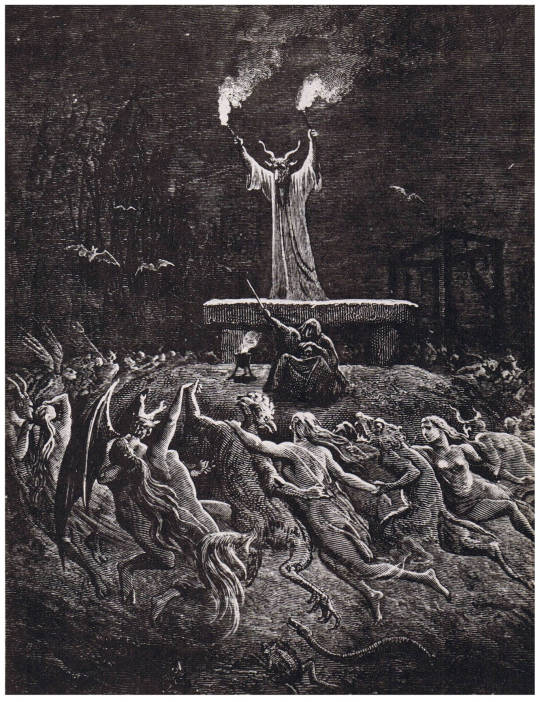
Walpurgis Night. Hexennacht. April 30.
A Short History of the Night of the Witches The origins of the image of Walpurgis night being a witches’ sabbath are unclear. However, it is striking that it coincides with Beltane and maybe other pagan festivals in earlier time. Goethe presumed in one of his poems such an origin.
St. Walpurga For Christians, Walpurgisnacht is also known as the Feast of Saint Walpurga, that is celebrated from the evening of April 30 to the day of May 1st. Saint Walpurga or Walburga was the daughter of St. Richard the Saxon Pilgrim and sister of St. Willibald and St. Winibald. When her father went on a pilgrimage with her two brothers to the Holy Land, he left Walpurga, who was only 11 years old at the time, with the nuns of Wimborne Abbey, where she was educated and learnt how to write.
She traveled in an attempt to bring German pagans to the Christian faith and she also authored Winibald’s biography, which is why she is considered as one of the first female authors in Germany and England. Walpurga became a nun in Heidenheim am Hahnenkamm, the monastery founded by her brother Willibald, where she became the abbess after his death in 751. Walpurga herself died on February 25 on 777 or 779 and she was canonized by Pope Adrian II on May 1st, around 870, when her relics were transfered to Eichstätt, Germany.
St. Walpurga is prayed to for protection against witchcraft and it is believed that during the night of April 30, she is able to ward off spells, witches, and evil spirits. This belief may stem from the overlapping of her canonization with Hexennacht or the Night of the Witches, the celebration that has its origin in ancient fertility celebrations. Hexennacht is a Germanic tradition more prevalent in the 17th century, when witches and sorcerers gathered together celebrate.
To protect against their magic, the Western Christian Church appointed the night of April 30 to St. Walpurga’s Feast. In the 18th and 19th centuries, Walpurgisnacht was popularized and its witchy connotations were revived through the literature of the time, such as in Jacob Grimm’s work who wrote in 1833: “There is a mountain very high and bare… whereon it is given out that witches hold their dance on Walpurgis night”.
Goethe also dedicated a poem to the celebration called “Die erste Walpurgisnacht” (The First Walpurgis Night), which was set to music by Felix Mendelssohn and published as his Opus 60 in 1843. The poem contrasts sharply with the Walpurgisnacht described in his main work “Faust”. In his ballad, Goethe relates the superstitions around Walpurgis night to the usage of devil’s masks by pagan’s in order to exploit the superstitions of their Christian suppressors and to protect their identities.
58 notes
·
View notes
Text

Fuck Ozzy all my homies hate Ozzy
17 notes
·
View notes
Text
✨Who did it?✨
Or, as an alternate title:
I can’t believe I have to play Devil’s Advocate for Ozzy…
Yes, your honor, he did haunt Elise until she passed away, ruined Roman’s life as collateral, sort of kidnapped Henri and almost murdered Goldia. I can’t deny that he is, in fact, the main villain in Pocket Mirror and sole responsible for the events in that game.

However!
In Little Goody Two Shoes, he isn’t the only schemer behind the scenes. Our second player is Walpurga — and I don’t think we’re giving her enough credit. It’s easy to misjudge her as a secondary threat in Elise’s path when, actually, she’s the main instigator.
I dare to say that she’s even the one to start it all, the one who led Elise to her eventual downfall! Ozzy just took the merit after she was out of the picture.
But before I go through the events of the game, let’s review what some characters have to say, in special when it comes to the lore. We’re going to be judging…

… their credibility.
Our dear Rozenmarine here is talking about Ozzy by the way, and we have already established that he is, in no shape or form, a benevolent entity. Nonetheless, she’s the most truthful character towards Elise: she even warns her of the heavy price she’ll have to pay for her wish. Not even Walpurga, who is the first one to mention all of this information, alludes to such a thing; in fact, she even outright lies about it when she says that the Gifts will be “all that’s requested in return”.
The other character that gives the most exposition is Father Hans, and like Rozenmarine and Walpurga before him, we have to take his words and judgement with a grain of salt — in special when it comes to Walpurga and her sanctification.
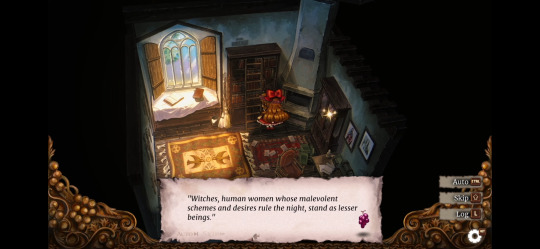
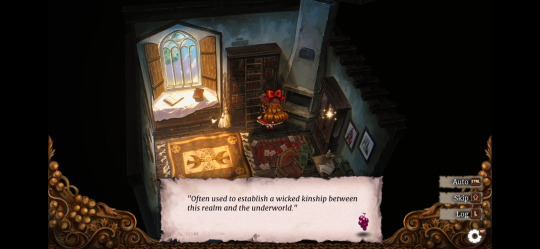
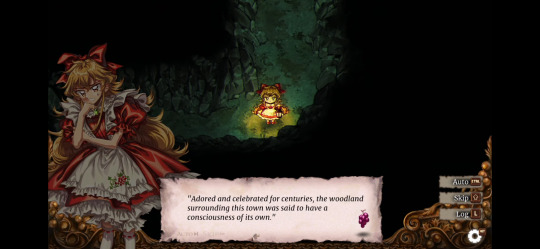
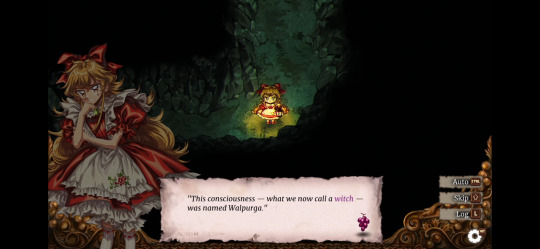
Case in point: if a witch is a human woman and Walpurga is the consciousness of the woodland surrounding Kieferberg, can we truly call Walpurga a witch? Or is a human woman a forest now?
Despite the flaws in his logic, Father Hans doesn’t question much the nature of what he’s trying to summon and when he does, briefly worrying about the possibility of Walpurga being a demonic entity masquerading as a witch, he foolishly believes he’ll be able to take care of it. If you’re aware of one of the endings, you know how well that went.
His judgement, therefore, cannot be trusted.
On one hand, the demons themselves refer to Walpurga as a witch as well — and it’s likely they know more about this than our two faced priest. On the other, they also don’t hide their contempt by calling her creature and wretched thing, so it’s just as probable they’re insulting her and refusing to respect her as a fellow “patron saint”.
Meanwhile, in one bad ending, Rozenmarine is way more respectful and names her “old god”…
Either way, my previous statement about Father Hans still stands. However, does that make the demons a more trustworthy source of information? Several characters —mostly Golden Maidens and Walpurga, who has ulterior motives— disuade Elise from listening to them, and to tell the truth, they don’t reveal much about themselves or their reasons to not raise suspicion. In a twist of irony though, they do reveal the deceit of others more than being deceitful themselves: it’s Murim who points out Walpurga disguising herself as Rozenmarine and being the actual culprit behind the horses and Apfel’s disappearance, after all. And it’s also Ozzy who lets Elise know that Walpurga had been misleading her from the very start — although far too late, at the very end: “You’re yet to pay for what you truly desire! That witch made you think otherwise, did she?”
In conclusion, we can’t take what they say at face value — or at least, not all of it. Still, they do offer important insight into the lore if you know who and what to believe.
An interesting bit I want to highlight and that gives a different interpretation of the game is related to Walpurga’s true identity: if she isn’t a witch, but a being similar to Ozzy and his Marquises, her inactivity during the 18 years Elise was alive could be linked to the need of a witch of her own, since they act as a sort of medium between realms.
Although that raises the question: who could be Walpurga’s witch? Let’s review the story from the beginning first.
Around the time of Elise’s birth, in a far away place, Rozenmarine and her dreams of fate were born as well, while one of the last remnants of Walpurga’s cult was being burnt at the stake — that, instead of Elise being conceived, might have been what truly weakened Walpurga.
Later, during their pilgrimage, her granny taught Rozenmarine everything she knew, including Ozzy’s folk tale. Like His name being lost to time, the reason his story was spread about in Rozenmarine’s coven could also had been forgotten; Elise did mention it sounded like a cautionary tale and perhaps, it originally had been — do demons like competition, I wonder.
As previously said, Elise’s genesis had fascinated Walpurga. She wanted back what was taken from her and also recreate what Ozzy had done that day to no avail. No matter how much that ate at her, in 18 years, she didn’t target Elise yet.
Not even Father Hans, perturbed by Granny Holle’s dead bed confession 10 years ago, acted upon his suspicions until both demons and Walpurga made themselves known in town. Or maybe he did, if Elise saying she felt ostracized after her granny passed away is anything to go by.
It’s when Rozenmarine reached Kieferberg, when everything happened all at once again: she met Flocke and her fateful dreams stopped; Elise got attacked by roots in her own home, but never again, and she dreamt of Ozzy’s realm even before getting the shoes; and a windstorm hir town, stirring Father Hans into action, believing it was the result of Granny Holle’s pact with the demons years ago.
Suddenly, everybody had a bone to pick with Elise. What changed? Rozenmarine.
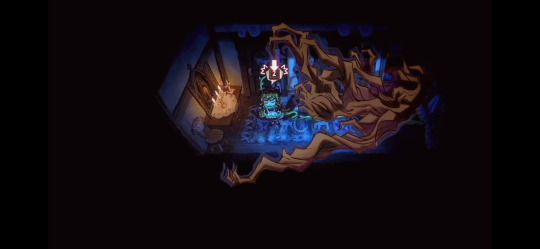
This scene here is what makes me think Rozenmarine is Walpurga’s witch. In the bad endings where Walpurga kills and possesses Elise, she does so by impaling her with roots or branches like the ones that appear here. Not to mention, it all occurs next to a St. Walpurga’s statue, like it were a macabre foreshadowing of her involvement in the plot. If she could always have done an attack such as this, why then and not before? Elise had been alone for years, living in a house far away from town — nobody would have heard her scream for help. It’s, however, easily explained if Walpurga required of an intermediary to physically manifest.
The curious thing is, like I mentioned earlier, that it doesn’t happen again. For some reason, Walpurga doesn’t get a second chance to attack Elise within her own home. Coincidentally —or not—, in the next morning, we are introduced to Flocke, who mostly stays around the house with Rozenmarine.
That incident, and Rozenmarine’s dreams about fate coming to an end, I believe are related to Flocke’s presence. It would be in Ozzy’s best interest, if Rozenmarine was supposed to aid Walpurga, that she were to be as much confused as possible about her true purpose in Kieferberg — lo and behold, depending on the ending, she has a different idea about what that purpose was.
Thus far, we have a back and forth between Ozzy and Walpurga, and it keeps going: unable to go after Elise directly and following the demon making his move to snatch her first —the shoes—, Walpurga lures the girl into venturing the woodland by telling her about the Gifts.
You’ll think that Ozzy would be pleased with the idea, after all, it played in his favor. But, judging by this mysterious line of his: “Although you didn’t quite need them (the Gifts), did you?” And the look he gives Elise after she returned with the basket, maybe things weren’t going according to plan at all.
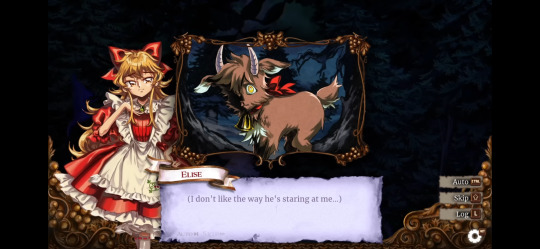
This is going to be pure speculation, however, it’s undeniable that Elise and Henri have certain parallelisms between them: their isolation and desire to escape it. Perhaps it goes further than that and Henri’s fate was supposed to be Elise’s as well: I don’t think he had to go through the Trials or sacrifice The Good Company, after all, he wouldn’t have followed her mother’s footsteps had there been someone in his life to alleviate his solitude, and it’s highly doubtful Elise would have told him about the Gifts to begin with. Like Henri, maybe she would have died in her sleep after the deal was sealed and she gave her name as payment, becoming Ozzy’s new loyal servant.
Furthermore, it could be possible that Ozzy only asked for her first born to spite Walpurga, who had been a sore thorn in his side through the whole game. Failing to procure Elise, she lost her only chance to become a woman and bear life in her womb, so what better way to twist the knife than to ask for a child with the sole intention of eating it? Because then, I don’t know how to explain the presence of the moths in the bad endings where he wins otherwise: did Ozzy kill Walpurga offscreen and steal her familiars? Maybe so.
As I said, it’s pure speculation, like Ozzy slowly grooming Henri into a demon, treating his name the same they do their own —with mystery— and giving him duties that eerily resemble what Murim and Aziel are tasked to do. So, in other words, let’s get back in track.
Before Murim was sent to meet Elise, Walpurga had kept herself busy with Eugen’s horses. We later find one, twisted into an enormous monstrosity —inspired by Mari Lwyd, maybe?—, which attacks Elise. It could have been Murim’s doing, however, he had already given Elise the Testament, meaning she had passed the Trial and was free to leave — like in Aziel’s domain. Not only that, the monster only appeared after the reason our heroine stayed —a disguised Walpurga—, finished her creepy monologue.
Walpurga apparently had something to gain if Elise died within the woodland, or else she wouldn’t have forced her back in Murim’s grove to rescue Apfel. In this second incursion, she also made an interesting revelation that supports this theory.
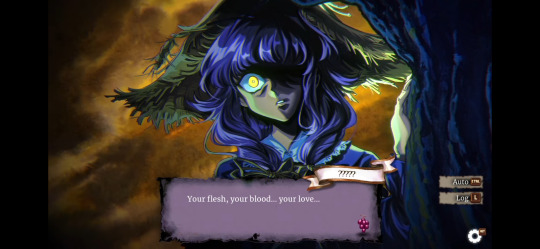

She always wanted the Gifts for herself — like Rozenmarine had explained at the start of the game, they represented Elise’s whole being. If she were to get her hands on the Tender Flesh, she gets Elise’s body; if she gets the Sweetest Nectar, Elise’s blood; and if she gets the Good Company, Elise’s love. And it illustrates so wonderfully why the endings happen the way they happen: if the Tender Flesh and/or Sweetest Nectar are offered, she can’t possess Elise and would rather she died in a pyre or have her turned into a tree; if the three Gifts are correctly offered, Elise is untouchable, the parts representing her under the protection of demonic sigils; and if Elise failed to offer any Gift, because they’re on her person one way or another, Walpurga gets to wear her like a costume.
Why the demons would do nothing after technically being offered and accepting the Gifts in the good endings, is a mystery on its own. Perhaps the commitment they were all on about, was the commitment to love? That brings us to Aziel’s grove and all of its mixed messages.
The next morning Elise rescued Apfel, Flocke can be witnessed throwing a tantrum and promptly leaving — Ozzy obviously displeased with Walpurga interfering so brazenly. The back and forth between the two beings never stops, even if Walpurga makes no further appearances —thanks to Aziel— other than in the endings and those branch attacks inside of Ozzy’s realm which, judging by his sigil after they have already crossed the portals, perhaps he’s trying to dispel instead of summon — the mist is also suspicious, being almost identical to that which follows the moths.
While in her domain, Aziel kept insisting to Elise that she should indulge and dive deeper into her desires, while pointing out that she has yet to discover what they are. It might be a red herring, but after Elise had confessed her wish to the old hag in the beginning of the game, Rozenmarine warned her with urgency that she shouldn’t disclose it to anyone. We’ve got to remember that one of Father Hans’s documents also describes how the woodland —Walpurga— harbored people’s wills, wishes, desires and sins in the past. Was Aziel trying to make our heroine know that her desire had been tampered with? Truth be told, Elise seems to yearn leaving Kieferberg more than riches, giving weak excuses as to why she doesn’t: “… if only it was that easy.” It is, in fact, since in the good endings she just does that. So, it could be possible.
The mixed messages, however, made themselves present during Aziel’s boss fight. After encouraging Elise to pursue her wish until then, Aziel asked to be shown how much Elise cares for her love interest. And if that wasn’t enough, she one-hit kills her if her answers didn’t prioritize her paramour —heavily foreshadowing the requirements for the good endings— while giving her this quote:
“Rather self-serving, aren’t you? You’re not worth my time, let alone His!”
Recalling the scene with the Golden Maidens, you can’t make me believe that some of them truly loved anyone in their lives, lest pass this Aziel’s test. Like, between the three first Golden Girls, who was supposed to be The Good Company: the one being murdered or the one thrown under the bus? The main one fitted the self-serving moniker perfectly and yet, Ozzy was to await for her in his banquet.
The fact that Ozzy would allow the Golden Maidens prowl around and warn Elise left and right is suspect as well. In his defense, he does say that they’re hard to tame.
Did the demons want Elise to succeed? Or perhaps they were quite content with Walpurga losing. If it’s the former, what a plot twist!
Nonetheless, I believe we have answered the original question quite well: who did it? The one who kickstarts the whole conflict is Ozzy, being responsible for Elise’s very existence to begin with, but the one who actually makes the first move to snatch our gal and keeps the pace of the game is Walpurga. Father Hans is also there, aiding Walpurga by ruining people’s livelihoods, when the demons only pulled what amounted to pranks in comparison — crows standing around menacingly and stealing some grain, and floods that caused no lasting damage.
🦋Still, I hope you enjoyed my descent to insanity and that you now appreciate Walpurga as the proactive villainess she is — not everything was Ozzy’s fault, even if he would love you to think so.🦋
74 notes
·
View notes
Text
Looking back over my screenshots again, I noticed something that bothers me: "Walpurgisnacht" is a name supposedly given to this witch by magical girls (and not what she calls herself, unlike the other witches we encounter), and yet that name appears in heavily stylized runes on her countdown signs in the original series. Why is that? Am I missing something?
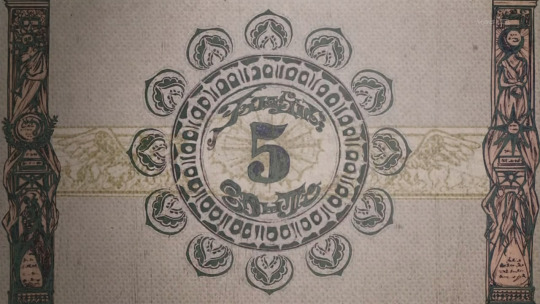
The same runes are also in the Eternal movie, although they are a bit more legible. Nothing else appears to have changed overall, although the shading/contrast on the ring and "peacock tails" (probably stylized lotus flowers common in Buddhist mandalas?) is switched up.

The art style here is reminiscent of sixteenth- and seventeenth-century European woodblock prints during the time of the original witchcraft trials. This movement was stoked in large part by the widespread proliferation of lavishly illustrated printed pamphlets, which detailed witches' misdeeds in lurid detail, and popularized many archetypes we now associate with witches, from brooms and black cats to deals and dances with the Devil.
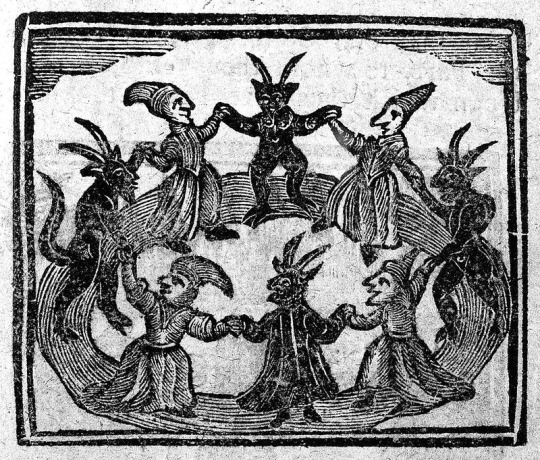
Witches dancing with devils, featured in The History of Witches and Wizards (1720).
Similar woodblock prints, likely representing primary sources, can be seen in the background in Homura's apartment as part of her research into Walpurgisnacht, including several with dancing figures.

These figures can be seen as Walpurgisnacht is ultimately broken up in the final episode.

Just for some fun visual parallels, compare to this shot from the recap movies that wasn't in the original TV release. The main difference is that all of the figures of Homuras are the same, whereas the ones in Walpurgisnacht's circle seem to be different.
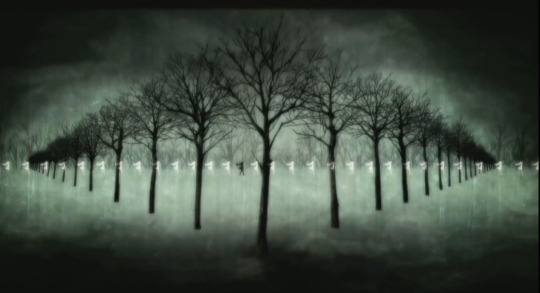
The woodblock print in Homura's apartment depicts all the dancers as identical, while the later shot makes them look more like Walpurgisnacht's individualized familiars--which they might well be. Comparison to the Clara Dolls--a large number of familiars repeatedly described as being a match for or counterpart to magical girls with individualized designs--is also inevitable.
Ironically, the Christian saint Walpurga was supposed to protect against witchcraft, but her saint's day (April 30-May 1) ended up being conflated with the witches because it occurred at the same time as Hexennacht (German for 'Witches' Night'), when witches were said to dance with/in honor of the devil on Mount Brocken--and thus when people were most in need of St. Walpurga's protection. Goethe draws on this tradition in Faust, Part One (a major influence on PMMM) for the scene where Mephistopheles takes Faust to the Brocken in order to witness the celebrations--which is also one of the texts depicted in Homura's apartment.

Another sheet reads "Ein Narr"--German for "the fool", another recurring motif associated with Walpurgisnacht (and also Homura).
Given the accuracy of these documents, these woodcuts are presumably based on eyewitness accounts (possibly magical girls, since ordinary people see Walpurgisnacht as a storm) where Walpurgisnacht appeared but was apparently not permanently defeated. Combined with Walpurgisnacht's ability to appear--and presumably disappear--without warning, and the fact that she's large enough to show up on radar as a storm, this suggests to me that Walpurgisnacht might be a time traveler or possess a similar ability to "exit the stage" and only reveal herself at the most dramatic moment(s) possible. Not only would this fit with her cog/stage motif, it would make her an even more fitting narrative foil for Homura, and add yet another parallel between them.
For both witches and ordinary humans alike, Walpurgis Night is traditionally celebrated with dancing and bonfires. Not only is Homura's name is a homonym for 'flame', Rebellion is chock full of ballet motifs, and she is last seen dancing alone in the moonlight late at night--presumably during the "witching hour" (which, depending on the source, is either between 3-4 a.m., or the hour immediately after midnight. Given the earlier scene of Homura becoming a witch as the clocks strikes midnight, I lean towards the latter interpretation).
Even more suggestively, Homura is now diegetically the Devil and appears to have taken on Kyubey's role as a contractor. If so, this strongly implies that she (and/or her double?) will have a personal relationship with magical girls as the one to whom they sold their souls to gain their power, just like historical witches were said to do with Satan. And given that these historical witches supposedly gathered on Walpurgis Night to honor the Devil... well, that does put Walpurgisnacht's likely (re)appearance in a new light, doesn't it?
...and if the 'Walpurgis' of Walpurgis no Kaiten is indeed the same Walpurgisnacht we saw before, then some timey-wimey/reality-bending/fourth-wall breaking shenanigans are afoot.
It's funny because "what were YOU doing at the devil's sacrament?" is usually meant as a tongue-in-cheek joke, but if PMMM continues to take these references seriously, we might actually get to find out!
98 notes
·
View notes
Text
A little fun fact about my AU here since AU Posting is busy.
You know that in several art pieces, I used Film Tape symbolism? My AU, basically can be interpreted as a theater play, in which the outcome is always a bad ending.
In context, Cosmounse made the script that way, and Fylass wants to rewrite the part of the script that's not written yet, based on countless other scripts he managed to see in back stage (Note, this is not literal, just an interpretation of certain outcomes based on that idea since the AU was partly written with that interpretation in mind, that's why in my fic, the names of the chapters are from other stories or plays).
Which for it, means that Fylass helped in changing the ending, with the help of the others, reason on why some parts of my AU seem to be very fitting in the context of a play. I made jokes about Fylass "Undooming the Doomed narrative" but it's not really that much of a joke, which pretty much implies that if no one had done anything or be made aware of what was happening, my AU would've always ended up in a hypothetical Bad Ending.
Besides the religious take on it that's basically what happened in the Garden of Eden with Fylass being Lucifer, and Adam and Eve being the ones he loves. The Apple is the "Forbidden Knowledge" so in this context is basically The Truth and yet another reason why Fylass' main color is Red.
It kinda goes along with the lines of Fylass hating Magolor! Just that in Magolor's case, He's both Jesus and Judas, but in Fylass' case, God and the Devil are one and the same, since at the end of the day, you can figure out he has both roles. Fylass did bring down the Pardus Clan with him, like how Lucifer brought down Adam and Eve, but also in Popstar he tries to take the role of a messiah figure to save 4 people, also why Crowned Fylass both takes inspiration from the bible and pagan holidays, with the main one being Walpurgisnacht (Witches Night).
Also for more parallels, Walpurgisnacht was a celebration for the person "Saint Walpurga" who seemingly kept the witches away from the masses and healed the sick, not too dissimilar from how Fylass behaves with the Dream Team and Wave Three. And last but not least, it was rumored that Saint Walpurga was a witch herself, and the reason why Fy is a basilisk, which are creatures that are kings of serpents, fire, and usually come from Hell.
Now Niru
Niru, for the ones that don't know, is Void Termina when Kirby was still part of him, being the body that surrounds Void's Soul. He is often associated with Water, but specifically fluids in general, since he's meant to be something that flows as time passes. He gave impurities and some darkness to his creations to truly enforce free will, but overall, he was sad seeing his creations be sad over these things and knowing that if they believe in god, they would be begging for them to cleanse their sorrows, so at one point, he regretted his decision and started to slowly consume those impurities himself, being something like, carry the burden of others upon himself, but eventually this made him lose himself in corruption and became Void Termina.
Before he was sealed though a part that wasn't corrupted by the Darkness was separated from him and became Kirby, while the Darkness that got loose in battle became 0, who can reincarnate constantly thanks to Niru's impurities.
At the end of the AU, both parts reunite, and Kirby swears that he, along with the others will help him carry the burden and cleanse him of his Impurities, something they achieve.
In terms of Motifs, if Fylass' motifs are religious, Niru's are Cosmic.
Normally, when a Star gathers insane amounts of energy, they explode and become supernovas, a thing that parallels Niru but instead of Exploding, he gets consumed by a Black Hole he did himself.
Also the fact that he's based on Owls, being Night Birds, and Lovecraftian Entities, specially Cthulhu, who belong to Cosmic Horror.
He also shares a motif with time and a play along with Fylass and Cosmounse
If Fylass is the Pendulum and the script writer, and Cosmounse is the hands and the Director, Niru is the Hours and the Play itself, or rather, he's the End Roll.
Also he's based on The Happy Prince
26 notes
·
View notes
Text
Hey so I found out something interesting
After finishing Little Goody Two Shoes was reading about german mythology, mysticism, legends and etc, then I came across something that caught my attention.
HEAVY SPOILERS FOR LITTLE GOODY TWO-SHOES!!
In 1932, a paranormal investigator who was known for debunking fraudulent spiritualist attempted a ritual at the top of Brocken, a peak at Germany, in Walpurgisnacht, also known as the celebration of Saint Walpurga's Eve and the night of the Witches.
The ritual was called "Bloksberg Tryst" which was made for turning a goat into a human young boy, featured in a grimoire called High German Black Book.
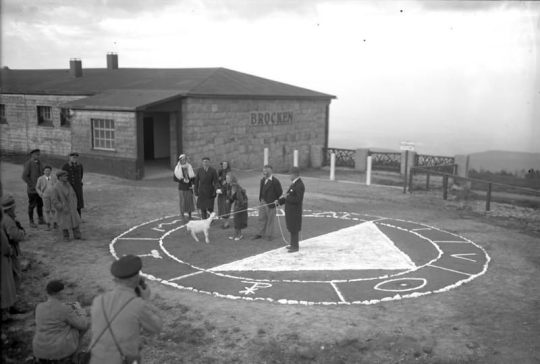
Does it sounds familiar? In Little Goody Two Shoes, at the night of the festival of Walpurga, there is also a goat that transforms into a young boy. Ozzy!
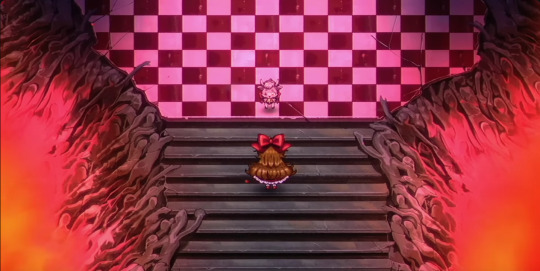
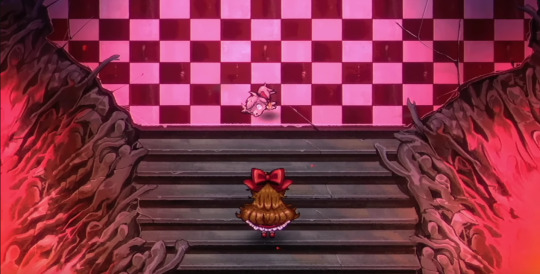

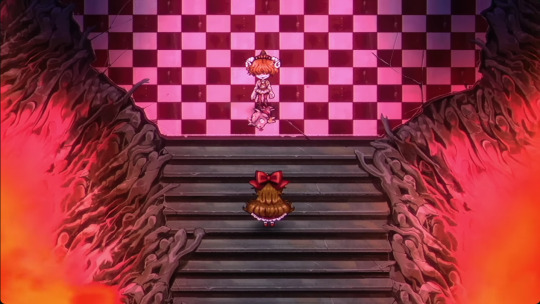
I don't know if the devs made it on purpose or not, but it's very interesting nonetheless.
#little goody two shoes game#little goody two shoes#pocket mirror#lgts#astralshift#little goody two shoes spoilers#lgts spoilers#ozzy little goody two shoes
34 notes
·
View notes